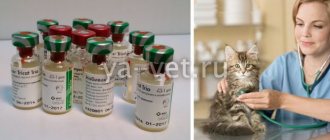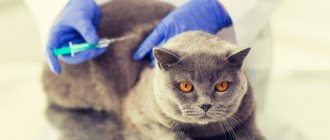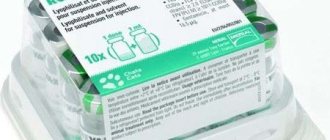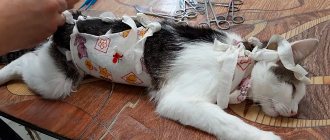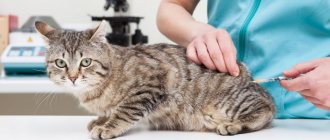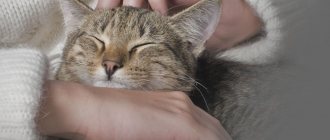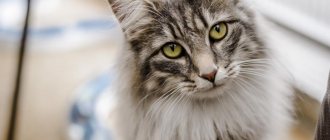A veterinarian vaccinates a cat.
Preventive vaccination of pets has long become an integral part of their care. Everyone knows: it is easier to prevent any disease than to fight it later. And cat vaccination is the most effective way to protect your furry friend from many dangerous diseases.
Vaccination of cats requires compliance with certain rules of preparation and adherence to a schedule. And it is carried out taking into account the age characteristics of the animals, as well as their condition at the time of the procedure.
Important arguments in favor of vaccinating cats
Does my cat need to be vaccinated? Before we begin to understand the intricacies of veterinary medicine and the most important recommendations, let's remember what we know about animal vaccination in general. Vaccination (vaccination) is a whole complex of measures, including the preparatory stage, the procedure for administering the protective drug and the post-vaccination stage.
Interesting: the concepts of “vaccine” and “vaccination” are somewhat different. Not many people know this, and often use both medical terms as synonyms. Differences: a vaccine is a medical product that contains a weakened viral strain; when it is detected, the animal’s body begins to produce protective antibodies itself, forming the necessary immunity. “Vaccination”, also known as “vaccination”, is the procedure or process of administering the vaccine.
Vaccination result:
- After vaccination, a cat acquires enhanced immunity;
- The development of severe, including fatal, cat diseases is excluded;
- There is no need to worry about the possibility of contracting rabies;
- No worries about the cat being outside.
Do cats need vaccinations? A definite answer “yes” can be obtained not only from specialists, but also from most ordinary lovers of furry pets. Vaccination is an almost 100% way to avoid serious cat health problems.
Another argument in favor of vaccinations is that the diseases they are aimed at preventing are difficult to treat or cannot be treated at all. So preventive vaccination is the only option to protect your cat.
Is it possible to refuse vaccination?
Cat vaccination process
Some cat owners deliberately do not vaccinate their pets. Their explanation: animals must develop their own immunity against various infections. The main thing they forget is that a domestic cat is not a wild animal, and its body is more susceptible to the action of bacteria and viruses. Even outdoor cats are better protected than indoor cats.
The statement “a cat never goes outside and can’t catch anything” is also easily broken by criticism. Most causative agents of cat diseases can enter a house or apartment with their owners or simply be blown through an open window by the wind.
Whether to vaccinate or not is a personal decision for each cat owner. But fortunately for pets, those who ignore vaccination are becoming fewer and fewer over time.
What does vaccination help with?
Modern veterinary science, thanks to the creation of preventive vaccines, is able to prevent the development of many common cat diseases, which can often lead to very sad consequences. Here are the vaccinations your cat needs:
- Vaccination against rhinotracheitis (feline herpes);
- Vaccination against feline panleukopenia (distemper in cats);
- Administration of the chlamydia vaccine;
- Microsporia and trichophytosis (vaccination of cats against lichen);
- Calcivirosis (“cat flu”).
Dogs that are given certain medications, such as cyclophosphamide, may also suffer from cystitis.
Does a cat need a rabies vaccination?
Vaccination of cats against rabies is a separate topic, which is why it was not mentioned above. This disease affects not only animals, but also humans. Are cats vaccinated against rabies? Not only do they do it, in some cases this procedure is even regulated by law.
It turns out that vaccinating a domestic cat against rabies is a guarantee of the safety of not only the pet itself, but also its owners. This means that it is necessary and obligatory. Don't neglect it. It is very easy to catch a dangerous disease; it is easily transmitted to humans. If he is bitten by a cat, a rabies vaccination can save the situation.
Mandatory vaccinations
It is impossible to force its owner to vaccinate a cat. But there are life circumstances in which vaccination and relevant documents confirming the vaccination of the animal (veterinary passport with marks) are required. First of all, this is traveling abroad.
Without mandatory vaccinations, the cat and its owner simply will not pass border control. So, which vaccinations against which diseases can be considered mandatory:
- Panleukopenia;
- Rabies;
- Calcivirosis;
- Rhinotracheitis.
To travel outside the country, vaccinations must be done no later than 1 month before the departure date.
It’s interesting: even the hotel administration may require a passport with mandatory vaccinations to check in with a pet; it will also come in handy when traveling by rail within our country and the CIS countries, especially in Western Europe.
Vaccines and their types
Currently, all preventive vaccines can be divided into several groups, which differ in their functional characteristics and composition of active ingredients:
- Polyvalent and monovalent . The former protect the animal from several diseases at once, the latter promote the production of antibodies to only one pathogen;
- Active and inactive . The first contains strains of weakened but still living pathogens, the second contains already “dead” pathogens. Inactive vaccines cannot maintain their preventive activity for very long.
Vaccines for animals
Currently, most experts give their preference to polyvalent drugs that can build immunity not only in adult cats, but also in kittens. An additional anti-rabies complex is often added to the main component of the vaccination, aimed at preventing rabies in animals. The most famous and widely used drug for cat vaccination is Nobivac.
Where can you get vaccinated?
Currently, almost every private and public veterinary clinic provides kitten vaccination services. But who is better to trust? Most kitten breeders prefer private specialists, and there are good reasons for this.
It is believed that paid offices are cleaner. Although such a judgment is subjective. In addition, private veterinarians purchase more expensive vaccine preparations, devote more time to preliminary examination of the furry patient, as well as advice regarding the post-vaccination period and care of the kitten. If you have the financial opportunity, it is better to do it for a fee.
The most responsible cat owners prefer to vaccinate their pets at home. To do this, they call a doctor at home. Indeed, this method of vaccination is the safest; the pet is protected from contact with sick animals and is not exposed to the stressful situation associated with traveling in transport. The only negative is that such a technique will require considerable material investment.
Read. Vaccinations for piglets from birth at home
Timing and schedule of vaccination
Now everyone knows what vaccinations are given to cats, but a new important question arises for cat owners: at what age are cats vaccinated? Early enough. The first vaccination is given to kittens at the age of 8-12 weeks. Their body is already stronger and is able to take on a small preventive infectious blow. A month later the vaccination is repeated. Then the cats are vaccinated annually.
Important: the age of cats for vaccination is very important! The first vaccination should not be done before two months. This procedure will simply be useless. The kitten's passive immunity, acquired from maternal feeding, will respond to the vaccine and destroy all pathogens contained in it. Immunity will not be formed.
In very rare cases, if there is a high risk of infection, vaccination is carried out for a period of 6 weeks. The kitten has not yet been weaned from the cat, but its milk is no longer the main food component.
Subsequently, adult cats are vaccinated every year. Sometimes more often, but according to the recommendations of specialists. You can follow the following general cat vaccination schedule:
| Schedule for mandatory vaccinations | |||
| Disease | First vaccine | Repeated vaccination | Revaccination |
| Rhinotracheitis + calicivirosis + panleukopenia | 8-12 weeks | A month later | In a year |
| Rabies | 8-12 weeks | Not produced | Annually or once every 2-3 years (depending on the drug administered) |
Recommended vaccinations are also included in the cat vaccination schedule:
| Recommended Vaccine Schedule | |||
| Disease | First vaccine | Repeated vaccination | Revaccination |
| Chlamydia | 9-12 weeks | A month later | In a year |
| Infectious peritonitis | 16 weeks | 20 weeks | Once a year |
| Ringworm (trichophytia, microsporia) | 8-9 weeks | 10 weeks | In a year |
The timing of vaccination depends greatly on the drug used. Modern veterinary pharmaceuticals are capable of creating vaccines to protect domestic animals from some infectious diseases for up to 3 years.
If the schedule is off
Situations where people forget about vaccinating a pet arise quite often. There is no need to be upset: not all is lost. You just need to contact a veterinarian, who will tell you what to do correctly in such a situation and adjust the vaccination schedule taking into account unforeseen circumstances.
How are kittens vaccinated?
In veterinary medicine, kittens are vaccinated against pathogenic viruses and bacteria with live and non-live vaccines. Live ones, according to experts, contribute to quick and effective protection against infection, but may be accompanied by complications. Non-live vaccines are extremely rarely accompanied by allergic reactions, but are characterized by a longer period of antibody production.
Vaccinations are also divided into monovalent and complex. Monovalent vaccines protect against one infection, while a complex vaccine includes several types of virus. All biological products are subject to mandatory certification.
For rabies
The following rabies vaccinations are used in veterinary practice:
- Rabikan. A domestic drug with a standard revaccination period of once a year.
- Rabizin is a monovalent rabies vaccine.
- Nobivac Rabies is a popular, high-quality drug from a Dutch manufacturer.
In addition to monovalent vaccines, cats can also be protected from the rabies virus using complex medications. For example, Quadricat not only serves as a preventive measure against rabies, but also prevents infections such as panleukopenia, calcivirosis and viral herpes.
From the plague
The following medications will help protect your pet from panleukopenia:
- Nobivac Tricat Trio. One of the best live vaccines against plague, rhinotracheitis and calcivirus infection.
- Multifel-4. A domestic drug designed to protect your pet from rhinotracheitis, calcivirosis, distemper and chlamydia.
- Feo-O-vax. American analogue of Multifel-4.
- The quadricate also contains a set of panleukopenia pathogen antigens.
From deprivation
The owner can prevent ringworm in a cat by using the following medications:
- Microderm.
- Vakderm.
- Polivak TM (for cats).
The peculiarity of these drugs is that they are used not only for prevention, but also for treating animals from lichen.
From coronavirus
Only one vaccine currently developed and approved for use in the country, Primucell from Pfizer, can protect a pet from coronavirus infection. The American-made drug contains attenuated coronavirus and forms immunity against infectious peritonitis in cats.
Preparing for cat vaccination
Cat owners know that they need to do some preliminary preparation before vaccination. First of all, it involves deworming. The main reason for carrying out this procedure is that anthelmintic drugs eliminate the appearance of many unnecessary complications, promote the active production of antibodies, without dispersing immune forces to fight the parasites present in the cat’s body.
It is not necessary to deworm a cat immediately before vaccinations. First, the animal is examined for the presence of external parasites (fleas, ticks, lice), and if they are present, treatment is carried out. A few days after this, deworming can be carried out.
Measures to remove intestinal parasites must be carried out no later than 15-25 days before the vaccination itself.
Interesting: whether or not to feed a cat before vaccination is another point that attracts the attention of pet owners. In fact, it is not that important. Because whether a cat is full or not has no meaning for vaccination.
Why is vaccination necessary?
Natalya Lvovna Sumarokova, a veterinarian at the VetSphere-9 clinic, talks about vaccinations, contraindications, vaccines and much more.
Vaccination of animals is a preventive measure that allows the animal’s body to prepare in advance for a “meeting” with a harmful microorganism (virus, bacteria, fungal spore).
A virus or bacteria is an antigen, that is, a foreign object that the body does not need, which it tries to block with antibodies. In unvaccinated animals, these antibodies simply do not yet exist in the blood, and the body sometimes needs considerable time to produce them. Moreover, the more virus that enters the body, the greater the amount of antibodies needed to neutralize it.
What happens when a virus enters the body of an unvaccinated animal?
The animal’s body does not have time to produce the required amount of antibodies and the kitten falls ill with an infectious disease, since the task of any microorganism that enters the environment of the host organism is to get ahead of the immune system, multiply very quickly, affecting the accessible organs and tissues of the animal, and this multiplication proceeds much faster than the production of antibodies immune system.
I note that this process is most dangerous for young animals - puppies and kittens, due to the fact that their immunity has not yet been formed and the immune system works very slowly. This is why vaccinations are necessary for this age group, and why viral diseases such as parvovirus have such dire consequences for puppies, often leading to death.
How does the vaccine work?
A vaccine containing antigens (weakened or killed viruses that are unable to harm the body) is administered subcutaneously or intramuscularly to the kitten. Thus, the antigen enters the body, but does no harm.
The immune system perfectly recognizes that this is an antigen and needs to be neutralized. The procedure of “selection of keys” begins, that is, recognition of the type of antigen, the production of specific (intended specifically for this virus) antibodies that neutralize the virus introduced with the vaccine.
The immune system, as it were, “remembers” that there was an attempt to attack the body with this virus and during subsequent attacks (now real ones) it reacts instantly, releasing “hordes” of antibodies into the blood, which instantly neutralize the virus and protect the cat’s body.
Alas, the state of “immune memory” does not last forever, so the system needs to be reminded that such dangerous antigens exist by periodically revaccinating (re-vaccinating) after a certain time.
Vaccination for a cat: rules and recommendations
After deworming, the cat is not vaccinated immediately. Before administering the vaccine, it is necessary to examine the animal. His general condition, temperature, tests are important components of the conclusion about the possibility of vaccination. If everything is fine with the cat, the main procedure of administering the vaccine begins. It takes no more than a minute, sometimes even seconds. Often the vaccination will consist of not one, but two injections. As mentioned above, the second injection is the introduction of a rabies preventative.
There are no trifles here: the correct choice of drug, injection skills, consultation on possible complications - these are the main arguments in favor of the fact that vaccination should be done by veterinarians.
Vaccine selection
The correct choice of medication for vaccination is one of the main components of “immune” success. Professionals are guided by the following rules:
- young cats are imported products with a mild effect; adult cats can be vaccinated with a variety of drugs;
- the instructions are required to be studied;
- Compliance with expiration dates is an important condition for ensuring the effectiveness of a medicinal product.
Information about vaccination must be recorded in the veterinary passport. Usually a special sticker is glued into it, which is included with the administered drug.
Self-vaccination
Some people vaccinate their pets themselves. According to veterinarians, this is an additional health risk. Not every cat owner is able to give the injection correctly, much less has sufficient qualifications to select the drug and its dosage. The result is a visit to the veterinary clinic, but not for vaccination, but to eliminate the consequences and complications.
Complications and side effects
Negative consequences of vaccination are unlikely, but their occurrence is not excluded and depends on the state of the animal’s body. Although the risks are minimal, your cat may develop the following complications:
- Allergy. Observed in the first 15 minutes after injection of the drug. Signs: drooling, breathing problems. Since veterinarians do not advise leaving the clinic for half an hour, timely assistance with the use of antihistamines solves the problem;
- Swelling, redness at the injection site. It does not pose a serious danger and is not accompanied by other symptoms. The irritation goes away quickly, the cat’s lump disappears after vaccination, but if purulent formations form, you should immediately consult a doctor;
- Incubation. If the infection in the cat’s body was in the incubation period at the time of vaccination, a sharp development of the disease begins. If quarantine is observed before vaccination and a thorough examination by a specialist, this negative effect is excluded.
After vaccination, the cat may be lethargic or, on the contrary, hyperactive, there may be slight disturbances in appetite, and a slight increase in temperature. Most likely this will be the result of stress.
Important: cats picked up on the street cannot be vaccinated without prior quarantine and testing. Vaccination not only may not help, it can provoke illness, which will greatly harm a pet taken from the street.
Which vaccines to choose
List of vaccines for cats and kittens:
- Purevax.
- Nobivak.
- Multifrel.
- Leucorifelin.
- Quadricate.
- Fort Dodge Fel-o-Wax IV.
- Rabizin.
- Felocel.
- Leucocel.
- Microderm.
- Felovax.
Today, the first 2 vaccines on the list are considered universal, effective and extremely safe. In second place are Felovax and Multifrel.
Table of vaccine characteristics using Nobivak as an example:
| Name | Diseases | Kitten age |
| Nobivak Forcat (multicomponent) | Calcivirosis Rhinotracheitis Panleukopenia Chlamydia | from 8 weeks |
| Nobivac Tricat (triple protection of immunity against viruses) | Calcivirosis Rhinotracheitis Panleukopenia | 8–12 weeks |
| Nobivac Rabies | Rabies | 12 weeks |
Important! Nobivak Rabies can be mixed with other Nobivak vaccines.
How to prepare a cat for vaccinations
Step-by-step scheme for preparing cats for vaccination:
- Eliminating fleas - they are carriers of helminths. The animal bites the flea, swallows the microscopic eggs of the parasite and becomes infected.
- Deworming 1–2 weeks before the procedure.
- Examination on the day of the procedure - the doctor measures the temperature, checks the oral cavity and conjunctiva of the eyes for the presence or absence of inflammation.
Note! If before scheduled vaccination the cat had contact with an infected animal, vaccination is postponed for 14 days.
Care after vaccination
Rules for caring for a kitten after vaccination:
- Protect the animal from stress, drafts, and injuries.
- Do not bathe for 3–4 days.
- Do not overload with active games for several days.
- Do not overfeed.
Important! After a preventive or routine vaccination, you should not leave the clinic immediately. You need to wait 15 minutes. During this time, the doctor will observe the animal. If there is no acute allergic reaction, you can go home.
Vaccination done. What to do after vaccination?
After vaccinating your cat, you do not need to leave the veterinary facility immediately. It is necessary to monitor the cat’s condition, and if it suddenly worsens, the veterinary office will be at your arm’s length.
Once at home, you need to pay attention to the condition of the animal for several weeks. Usually a cat is lethargic after vaccination; he needs to be provided with good nutrition and protected from possible negative factors (change of residence, water treatments, excessive activity).
Any cat owner should monitor their health. Vaccination is the only way to protect them from contracting deadly diseases. If you have vaccinated your cat against rabies and other diseases correctly, then your furry friend will always be full of strength, and his owner will not experience any nervous shock related to the well-being of his furry pet.
Boost your immunity naturally
Vaccination of cats is an important issue, but do not forget that any vaccine is a medicine. Any medical medicine can cause side effects. It is important to boost your cat's immunity in natural ways. To increase your pet's immunity, provide good living conditions. Keep the tray clean and regularly clean the cat's sleeping area.
The health of cats, like people, largely depends on nutrition. A healthy, biologically appropriate diet will provide a strong, stable immune system that will protect your pet from various ailments and disorders.
How much does a cat's vaccination cost?
The cost of cat vaccination is not prohibitively high and is affordable to everyone. Compared to the problems that can be caused without vaccination, the cost is very much worth it. For example, the price of rabies vaccination for a cat is in no way comparable to the financial, moral and time losses that may arise if you refuse to vaccinate your beloved “fluffy” in a timely manner.
Below are the prices for vaccinations at the Univet veterinary clinic.
| VACCINATION OF CATS PRICES | ||
| Vaccine name | Cost, rub) | Note |
| Nobivak Tricat Nobivac Tricat R | 950 1200 | Cat vaccination includes:
|
| Nobivak Forcat Nobivak Forcat + R | 950 1200 | |
| Quadricate | 1200 | |
| Felovax Felovax + Nobivac Rabies | 950 1200 | |
| Purevax FelV (feline viral leukemia) | 1200 | |
| Purevax RCP (calicivirosis, panleukopenia, rhinotracheitis) | 950 | |
| Purevax RCP (calicivirosis, panleukopenia, rhinotracheitis) + Rabizin (or R) | 1200 | |
| Purevax RCPCh (chlamydia, panleukopenia, rhinotracheitis, calicivirosis) | 1450 | |
| Purevax RCPCh (chlamydia, panleukemia, rhinotracheitis, calicivir) + Rabizin (R) | 1450 | |
